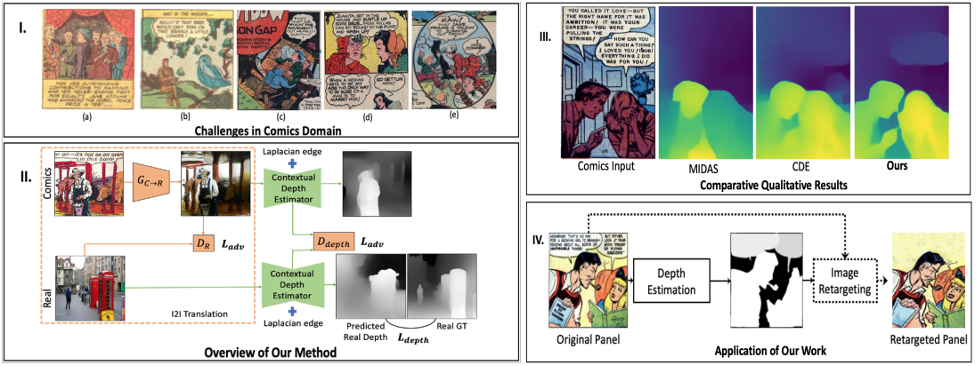Deblina Bhattacharjee, Martin Everaert, Mathieu Salzmann, Sabine Süsstrunk
WACV 2022 Paper: https://arxiv.org/abs/2110.03575
https://ivrl.github.io/ComicsDepth/

- Install pytorch,torchvision
- Install apex
conda install -c conda-forge nvidia-apex
DCM dataset
Follow the instructions at [https://git.univ-lr.fr/crigau02/dcm_dataset/tree/master](https://git.univ-lr.fr/crigau02/dcm_dataset/tree/master) to get the images and annotations and place the downloaded folder *dcm_dataset.git* to *REPO_NAME/data*.
eBDtheque dataset
Follow the instructions at [http://ebdtheque.univ-lr.fr/registration/](http://ebdtheque.univ-lr.fr/registration/) to get the images and annotations and place the downloaded and uzipped folder *eBDtheque_database_v3* to *REPO_NAME/data*.
Manga109 dataset (optional)
Follow the instructions at [http://www.manga109.org/en/download.html](http://www.manga109.org/en/download.html) to get the images and annotations and place the downloaded and uzipped folder *Manga109_released_2020_09_26* to *REPO_NAME/data*.
COCO 2017 dataset
Download the *2017 Val images [5K/1GB]* folder at [https://cocodataset.org/#download](https://cocodataset.org/#download), unzip it, rename it to *coco_val2017* and place it to *REPO_NAME/data*.
Generating cropped images from the DCM dataset
In the DCM dataset, one image corresponds to one page. In order to train the models, we should have one image per frame. To generate those cropped images in the REPO_NAME/data/dcm_cropped folder, use script:
python datasets_preparation.py --crop_frames
Generating comics text areas mask from the eBDtheque dataset
We use the eBDtheque dataset to detect the text areas in the comics images and mask them to remove text-based artefacts in the depth predictions. To do this, split the eBDtheque dataset into train/val/test and run the script:
python datasets_preparation.py --generate_text_masks
This step requires a lot of manual annotation work and the benchmark will be updated and extended in future to contain more number of images. Please contact the authors for the newest version of the annotated benchmark. The curreent version is under th RELEASES section. Also, if you want to contribute to this benchmark please contact the authors. Those ground-truth depth ordering must be place under REPO_NAME/data/dcm_cropped/depth.
In order to train our models, we want to have the depth of real-world images, which we achieve using MiDaS. We do this once, instead of doing it at run-time. Those ground-truth depth of natural images can be placed under REPO_NAME/data/coco_val2017_depth. To generate them, we use the script:
python datasets_preparation.py --coco17_depth
We train a Unet on the eBDtheque dataset as it contains comics text annotations. We use the following script:
python comics2textareas.py --train
Few tricks that can be used: We select the epoch with the highest validation IoU at threshold 0.5, using the following script:
python comics2textareas.py --select_epoch
To optimize the threshold, we use the followinf script:
python comics2textareas.py --optimize_threshold
To visualise the text detection results trained on eBDtheque and tested on both eBDtheque test as weell as DCM we use the following scripts:
python comics2textareas.py --visualize_ebdtheque_val
python comics2textareas.py --visualize_dcm
It is important to reemove the text-based artefacts in the depth prediction of comics, for which we eventually run our depth predictor on the comics images without text areas. Therefore, to generate the comics images without the text areas we run the following script: (Note that it requires the step above with a trained Unet)
python comics2textareas.py --generate_dcm_without_text_areas
We translate the images from the comics domain to the real domain and vice-versa by using an off-the-shelf state-of-the-art unsupervised image to image translator. To do so, we run the following script:
python translation.py without_text --train
python translation.py without_text --visualize_val
We train the Contextual Depth Estimator CDE.
python depth_estimator.py add_text_ignoretext --train --lr 1e-6
Generate depth images
python translation.py without_text --generate_depth_images
python translation.py without_text --visualize_depth_images
Quantitative evaluations
python evaluation.py depth_estimator without_text
All models are available at https://drive.google.com/drive/folders/1df-jlouewbr2wLAQtlWzL4Hf5pxT2hHz?usp=sharing
If you find the code, data, or the models useful, please cite this paper:
@InProceedings{Bhattacharjee_2022_WACV,
author = {Bhattacharjee, Deblina and Everaert, Martin and Salzmann, Mathieu and S\"usstrunk, Sabine},
title = {Estimating Image Depth in the Comics Domain},
booktitle = {Proceedings of the IEEE/CVF Winter Conference on Applications of Computer Vision (WACV)},
month = {January},
year = {2022},
pages = {2070-2079}
}
[Creative Commons Attribution Non-commercial](https://creativecommons.org/licenses/by-nc/4.0/deed.en)